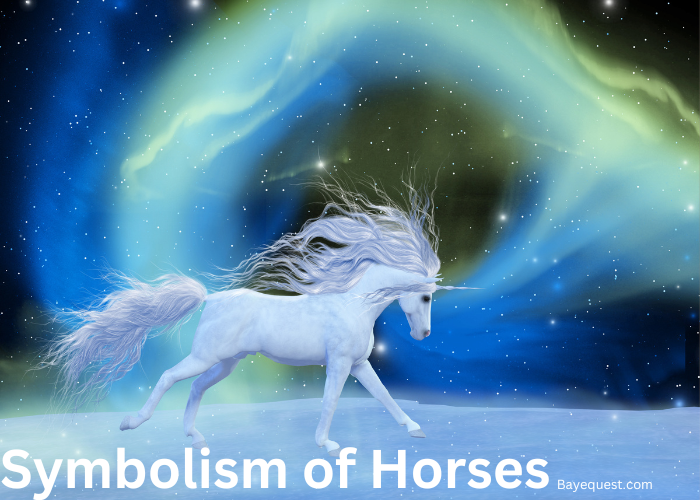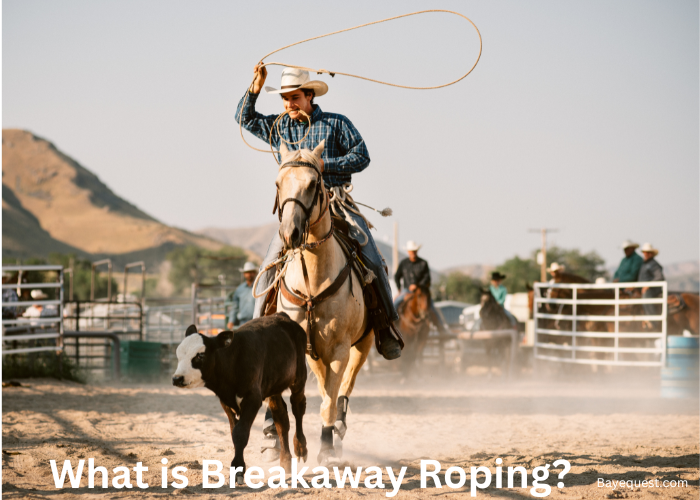Horses are legends, symbols, and stories wrapped in muscle and speed. For centuries, they’ve carried warriors, pulled kings’ carriages, and raced across wild landscapes.
They stand for power, freedom, and strength. In myths, they have wings, extra legs, or the ability to guide souls.
In real life, they inspire loyalty and adventure. From the battlefield to the racetrack, horses have shaped history and culture.
But what do they really symbolize? Why do we still see them as more than just creatures?
Let’s dive into the fascinating world of horse symbolism.
Symbolism of Horses: Key Takeaway
Horses symbolize strength, freedom, and wisdom across cultures. They represent power in war, speed in travel, and spirituality in myths. From Pegasus in Greek mythology to the Arabian horse in Arabic culture, they hold deep meaning. Even today, horses symbolize endurance, loyalty, and adventure in stories, sports, and traditions.
Common Themes in Horse Symbolism
Horses have symbolized many things across cultures and history. Strength, freedom, loyalty—these themes appear again and again in myths, literature, and art.
Whether as noble warriors, untamed spirits, or mystical guides, horses represent powerful human emotions and ideals.
Let’s explore the common themes that make horses such timeless and meaningful symbols.
Horses as Symbols of Power and Strength
Horses have always been a symbol of power and strength. In ancient times, they played a crucial role in warfare.
Warriors rode them into battle, making horses a sign of dominance and victory.
Kings and rulers owned the strongest horses, proving their wealth and status. A powerful horse often meant a powerful leader.
In many cultures, horses also represented endurance. They could travel long distances, carry heavy loads, and survive harsh conditions.
This made them a symbol of resilience and determination. A strong horse was not just a helper but a sign of survival and success.
Horses appear in heraldry, often on coats of arms and royal crests. They symbolize courage, nobility, and strength.
Many great empires, like the Romans and Mongols, relied on horses to expand their territories. Without them, history would have looked very different.
Even today, horses still symbolize strength. They are used in sports like racing and show jumping, where speed and power matter.
A strong, well-trained horse is admired for its energy and ability. Whether in history or modern times, horses remain a powerful symbol of strength and endurance.
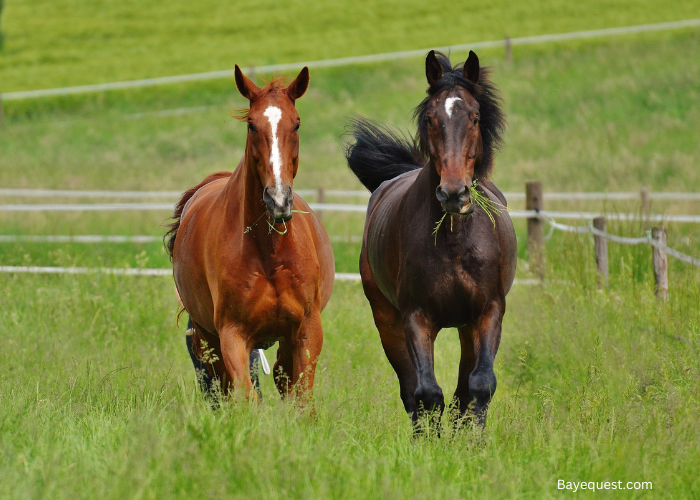
Horses as Symbols of Freedom and Independence
Horses have long been a symbol of freedom and independence.
Wild horses, like the mustangs of North America, roam without boundaries, representing the untamed spirit of nature.
They move as they please, living without restraint. This has made them a powerful image of personal freedom and self-expression.
In many cultures, horses are seen as a way to escape limitations. Before cars and trains, riding a horse meant having the ability to travel far and wide.
A horse gave people independence, allowing them to explore new lands and chase new opportunities.
Horses also appear in stories and films as symbols of breaking free. Think of the lone rider galloping away from trouble or the wild stallion refusing to be tamed.
These images remind us that true freedom comes from strength and determination.
Even today, horses inspire a sense of adventure. Equestrians talk about the bond between rider and horse, where trust allows both to move as one.
Riding a horse feels like flying without wings, reinforcing its deep connection to independence and self-discovery.
Horses as Spiritual and Mystical Symbols
Horses have deep spiritual and mystical symbolism across many cultures.
They are often seen as messengers between worlds, carrying souls, wisdom, and divine energy.
In myths and legends, they appear as magical creatures, guiding heroes on their journeys.
Some believe horses possess an instinct beyond human understanding, sensing things we cannot.
In many traditions, horses symbolize transformation. They represent personal growth, the journey of the soul, and the power to move forward in life.
A black horse may symbolize mystery and the unknown, while a white horse often represents purity and enlightenment.
Different colors and breeds carry different meanings, making horses even more mysterious.
Dreams about horses are also seen as spiritual signs. A strong, running horse may symbolize strength and progress, while a calm horse could represent peace and harmony.
Many people believe that seeing a horse in a dream means you are on the right path in life.
Some cultures see horses as sacred beings.
Native American traditions honor them as spiritual guides, representing wisdom and connection to nature.
In Hinduism, the horse-headed god Hayagriva symbolizes knowledge and learning.
Throughout history, horses have been linked to the supernatural, carrying messages from the beyond.
Even today, horses are viewed as powerful, almost mystical creatures. Their presence can bring a sense of calm, inspiration, and purpose.
Whether in dreams, myths, or personal experiences, horses remain deeply connected to the spiritual world.
Horses in Modern Symbolism and Culture
Horses continue to be powerful symbols in modern culture.
They represent speed, strength, and elegance, appearing in everything from company logos to sports teams.
Many luxury brands use horse imagery to suggest prestige and excellence.
Even car names, like the Ford Mustang and Ferrari’s prancing horse, show how deeply horses are tied to power and performance.
In psychology, horses symbolize ambition and energy. They are often associated with drive and determination, pushing forward without hesitation.
The phrase “hold your horses” reminds us to stay patient, while “horsepower” is still used to measure engine strength.
These expressions show how much horses remain part of everyday language.
Horses also appear in film and literature as symbols of loyalty and adventure. From Black Beauty to War Horse, their stories inspire courage and resilience.
In fantasy worlds, magical horses, like unicorns and winged steeds, continue to capture the imagination.
Even in therapy, horses play an important role. Equine-assisted therapy helps people build confidence, reduce stress, and improve emotional well-being.
Their gentle, intuitive nature makes them excellent companions for healing.
Whether in business, entertainment, or personal growth, horses remain a symbol of power, grace, and freedom.
Their legacy lives on, proving that their symbolism is just as strong today as it was centuries ago.
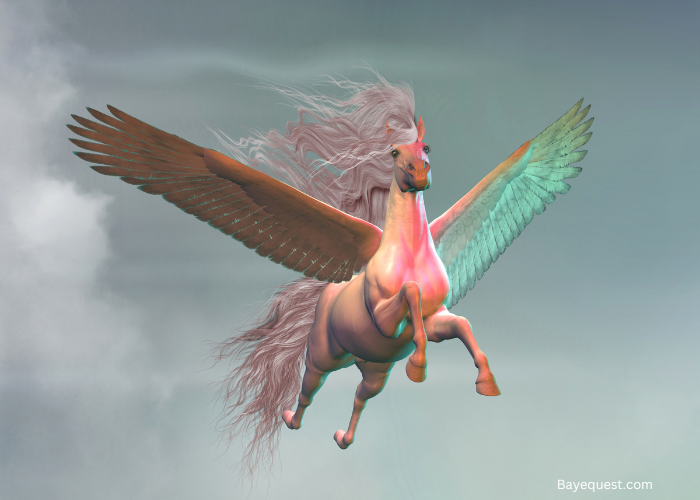
Horses in Mythology and Ancient Cultures
The Symbolism of Horses in Hinduism
In Hinduism, horses symbolize power, speed, and divine energy. They are closely linked to gods, rituals, and sacred texts.
One of the most important horse figures in Hindu mythology is Hayagriva, a deity with a horse’s head and a human body.
Hayagriva represents wisdom, knowledge, and enlightenment. He is worshipped as the god of learning and is believed to restore lost knowledge.
Horses also appear in Vedic rituals. The Ashvamedha Yajna, or horse sacrifice, was an ancient ritual performed by kings to demonstrate their power and divine right to rule.
A sacred horse was allowed to roam freely, and the land it covered symbolized the king’s authority.
In Hindu cosmology, horses pull the chariot of Surya, the sun god. His chariot is driven by seven horses, each representing a day of the week and the seven colors of light.
This symbolizes strength, movement, and the eternal cycle of time.
Horses are also associated with Kalki, the tenth and final avatar of Vishnu. In Hindu prophecy, Kalki will arrive on a white horse to bring justice and end the current age of darkness, known as Kali Yuga.
This makes the horse a symbol of divine intervention and the restoration of righteousness.
Overall, horses in Hinduism represent wisdom, power, and spiritual progress.
They are seen as sacred beings that connect the physical and divine worlds, playing an important role in mythology and religious traditions.
Horse Symbolism in China
In Chinese culture, horses symbolize strength, perseverance, and success.
They are associated with speed, endurance, and ambition, making them a powerful symbol in history, art, and philosophy.
Horses played a crucial role in ancient China, especially in warfare and transportation.
The Tang Dynasty (618–907 AD) considered horses symbols of military power and national strength.
Warriors rode them into battle, and emperors prized them as valuable assets. Owning a strong horse was a sign of status and wealth.
In Chinese mythology, horses are often linked to divine beings. The dragon-horse (Longma) is a legendary creature with the body of a horse and dragon-like scales.
It represents wisdom, energy, and spiritual enlightenment. Another famous horse is the celestial steed, believed to carry deities and heroes across the heavens.
Horses also have significance in Chinese astrology. Those born in the Year of the Horse (one of the twelve Chinese zodiac signs) are said to be energetic, free-spirited, and ambitious.
They are natural leaders who seek adventure and success.
In feng shui, horse statues or paintings are used to attract good fortune, especially in business and career growth.
A galloping horse symbolizes progress and determination, while a pair of horses represents strong partnerships and teamwork.
Overall, horses in Chinese culture represent speed, ambition, and prosperity.
They are a symbol of hard work and determination, reminding people to keep moving forward toward success.
Horse Symbolism in Greek Mythology
In Greek mythology, horses symbolize strength, wisdom, and divine power.
They are often linked to gods, heroes, and legendary creatures. Many myths feature horses as majestic beings with supernatural abilities.
One of the most famous mythical horses is Pegasus, the winged horse born from the blood of Medusa.
Pegasus symbolizes freedom, inspiration, and heroism. He helped the hero Bellerophon defeat the Chimera and later became a constellation in the sky.
Pegasus is also associated with poetry and the Muses, representing creative power.
Another important horse is Arion, a divine, immortal horse gifted with incredible speed.
He was said to be born from the sea god Poseidon and could outrun any opponent. Arion symbolizes endurance and divine favor.
Poseidon, the god of the sea and horses, played a major role in horse mythology.
He was believed to have created the first horse and was often worshipped as the protector of horses.
He is sometimes depicted riding a chariot pulled by sea horses, showing his connection to both land and water.
The four horses of Helios, the sun god, pulled his chariot across the sky each day.
These fire-breathing horses represented power, energy, and the cycle of time. Their journey symbolized the passage of day and night.
Horses were also important in Greek warfare. The Trojan Horse is one of the most famous symbols in history.
Though not a real horse, it represented deception and strategy, leading to the downfall of Troy.
Overall, horses in Greek mythology symbolize divine strength, wisdom, and adventure.
They are often linked to gods and heroes, showing their importance in both myth and culture.
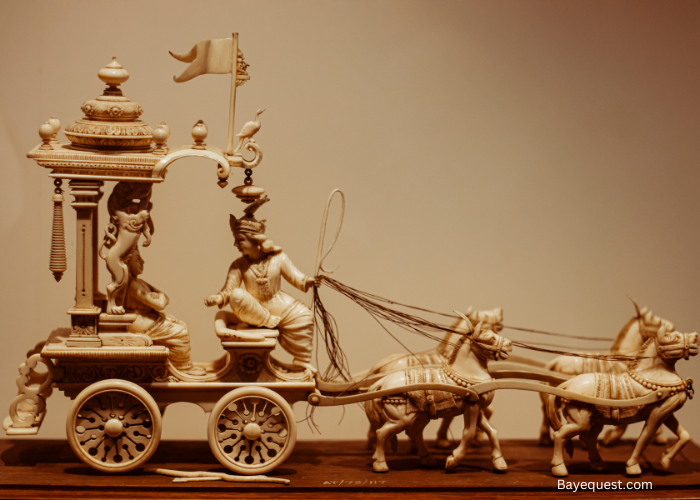
Horses in Arabic Culture
In Arabic culture, horses symbolize honor, nobility, and strength.
They are deeply respected and often associated with courage, loyalty, and divine blessings.
For centuries, horses have played a vital role in Arab history, from warfare to poetry and religion.
The Arabian horse is one of the most prized breeds in the world. It’s usually seen as a symbol of beauty and excellence.
Arab warriors relied on these horses in battle, making them an important part of military success. Owning a strong horse was a sign of wealth and status.
In Islamic tradition, horses are highly regarded. The Prophet Muhammad is said to have loved horses, and they are mentioned in the Qur’an as a blessing from God.
The famous story of the legendary horse Al-Buraq describes a celestial steed that carried the Prophet on his miraculous night journey (Isra and Miraj).
This makes the horse a symbol of divine connection and spiritual power.
Poetry and literature in the Arab world also celebrate horses. Ancient poets praised them for their bravery and speed, comparing them to the wind.
Horses were often described as loyal companions of warriors and travelers. Even today, Arabic poetry and songs continue to honor their grace and strength.
Horses are also seen in calligraphy and art. Traditional Arabic designs often feature stylized horses, representing power and elegance.
In modern times, Arabian horse racing remains a popular sport, keeping the cultural love for these animals alive.
Overall, horses in Arabic culture symbolize pride, strength, and deep spiritual meaning.
They are not just animals but treasured companions, representing the rich heritage of the Arab world.
The Symbolism of Horses in Norse Mythology
In Norse mythology, horses symbolize power, speed, and a connection between the human and divine realms.
They were highly valued by warriors and gods alike, often playing key roles in myths and legends.
One of the most famous horses in Norse mythology is Sleipnir, the eight-legged steed of Odin, the chief god.
Sleipnir was said to be the fastest and strongest of all horses, able to travel between worlds, including Asgard and the underworld.
His extra legs symbolize supernatural speed and endurance, making him a creature of both power and mysticism.
Horses were also linked to warfare and victory. Norse warriors often rode into battle on horseback, and horses were sacrificed to the gods for protection and success in war.
The god Freyr, associated with prosperity and fertility, had a sacred horse that symbolized abundance and strength.
In Viking funerary traditions, horses were sometimes buried with warriors to serve them in the afterlife.
This reflected the belief that horses had a role in guiding souls to their final resting place, reinforcing their spiritual significance.
The Dísir, female spirits who influenced fate, were sometimes depicted riding horses.
This added to the idea that horses had a mystical link to destiny and the unseen forces of the world.
Overall, horses in Norse mythology symbolize strength, loyalty, and the ability to travel between worlds.
They were seen as sacred beings, carrying gods and heroes across battlefields and even beyond death.
Horse Symbolism in Western Cultures
In Western cultures, horses symbolize freedom, power, and nobility.
They have played a central role in history, from warfare and exploration to farming and sports.
Their image is deeply woven into folklore, literature, and national identities.
One of the strongest associations with horses in the West is freedom.
Wild horses, like the mustangs of North America, represent the untamed spirit of the land.
Cowboys and frontiersmen relied on horses to travel vast distances, making them symbols of independence and adventure.
Horses also stand for strength and power.
In medieval Europe, knights rode into battle on mighty warhorses, showing courage and dominance.
The tradition of equestrian sports, such as dressage and racing, continues to highlight the horse’s speed and agility.
Even today, the term horsepower is used to measure engine strength, proving how deeply horses are tied to ideas of energy and force.
In literature and film, horses often represent loyalty and companionship. Stories like Black Beauty and The Lone Ranger celebrate the bond between horse and rider.
A strong horse is often a hero’s trusted partner, reinforcing themes of trust and resilience.
Horses also appear in Western symbolism and heraldry. Many royal and national emblems feature horses as signs of nobility and prestige.
The image of a rearing stallion conveys confidence, leadership, and honor.
Overall, horses in Western cultures symbolize freedom, strength, and companionship.
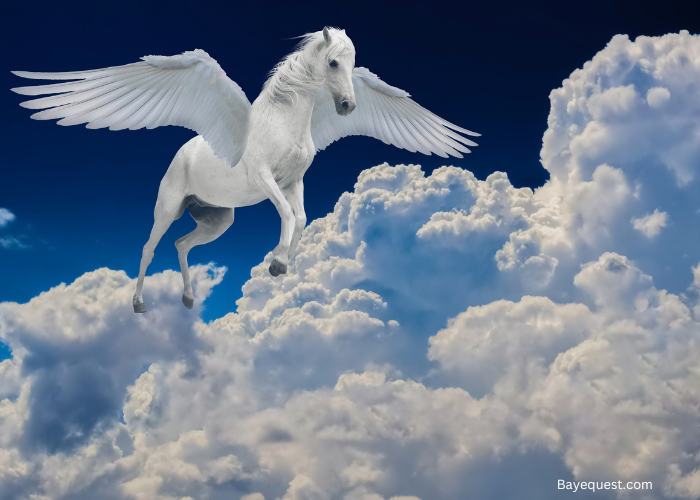
Iconic Symbolic Horses
Here are some of the most iconic symbolic horses:
1. Sleipnir (Norse Mythology)
Sleipnir is the eight-legged horse of Odin, the chief Norse god. He symbolizes speed, strength, and the ability to travel between worlds.
As a supernatural horse, he represents wisdom and Odin’s connection to the spiritual and physical realms.
2. Pegasus (Greek Mythology)
Pegasus, the winged horse of Greek mythology, is a symbol of freedom, inspiration, and heroism.
Born from Medusa’s blood, he helped the hero Bellerophon defeat the Chimera and later became a symbol of divine wisdom and creativity.
3. Al-Buraq (Islamic Tradition)
Al-Buraq is the celestial steed that carried the Prophet Muhammad on his night journey (Isra and Miraj).
This mystical horse represents divine will, spiritual ascension, and the connection between heaven and earth.
4. Bucephalus (Historical – Alexander the Great)
Bucephalus was the legendary horse of Alexander the Great. Known for his bravery and loyalty, he became a symbol of strength and the deep bond between a warrior and his horse.
His name lives on as a sign of courage and military power.
5. Arion (Greek Mythology)
Arion was a divine, immortal horse known for its incredible speed. He was said to be born from the sea god Poseidon and could outrun any opponent.
He symbolizes endurance, divine favor, and supernatural ability.
6. The Four Horses of the Apocalypse (Christian Symbolism)
In the Book of Revelation, four horses represent conquest (white), war (red), famine (black), and death (pale).
These horses symbolize major forces that shape human history and fate.
7. The Trojan Horse (Greek Legend)
Although not a real horse, the Trojan Horse is one of the most famous symbolic horses in history.
It represents deception, strategy, and the dangers of misplaced trust.
8. The White Horse of Uffington (English Folklore)
The Uffington White Horse is an ancient hill figure in England. It is believed to symbolize power, leadership, and possibly a connection to ancient Celtic mythology.
9. The Chariot Horses of Helios (Greek Mythology)
Helios, the Greek sun god, rode a chariot pulled by fiery horses across the sky. These horses symbolize power, the cycle of time, and the forces of nature.
10. The Horses of Saint Mark (Historical Art Symbolism)
These famous bronze horses, originally from ancient Greece or Rome, symbolize triumph and nobility.
They were displayed in Constantinople and later taken to Venice, representing conquest and cultural prestige.
Read also: How to Use Horse Puns in Everyday Life.
Horse Symbolism: Conclusion
Horses have meant many things to many cultures. They stand for strength, freedom, wisdom, and even the divine.
From ancient myths to modern life, they continue to inspire and symbolize power and endurance.
Whether as noble warriors, spiritual guides, or loyal companions, horses hold a special place in human history.
Their symbolism is timeless, crossing borders and generations. Even today, they remind us of resilience, courage, and adventure.
No matter how the world changes, the horse remains a powerful symbol of strength and spirit.
What do horses mean to you? Please let me know in the comments.




